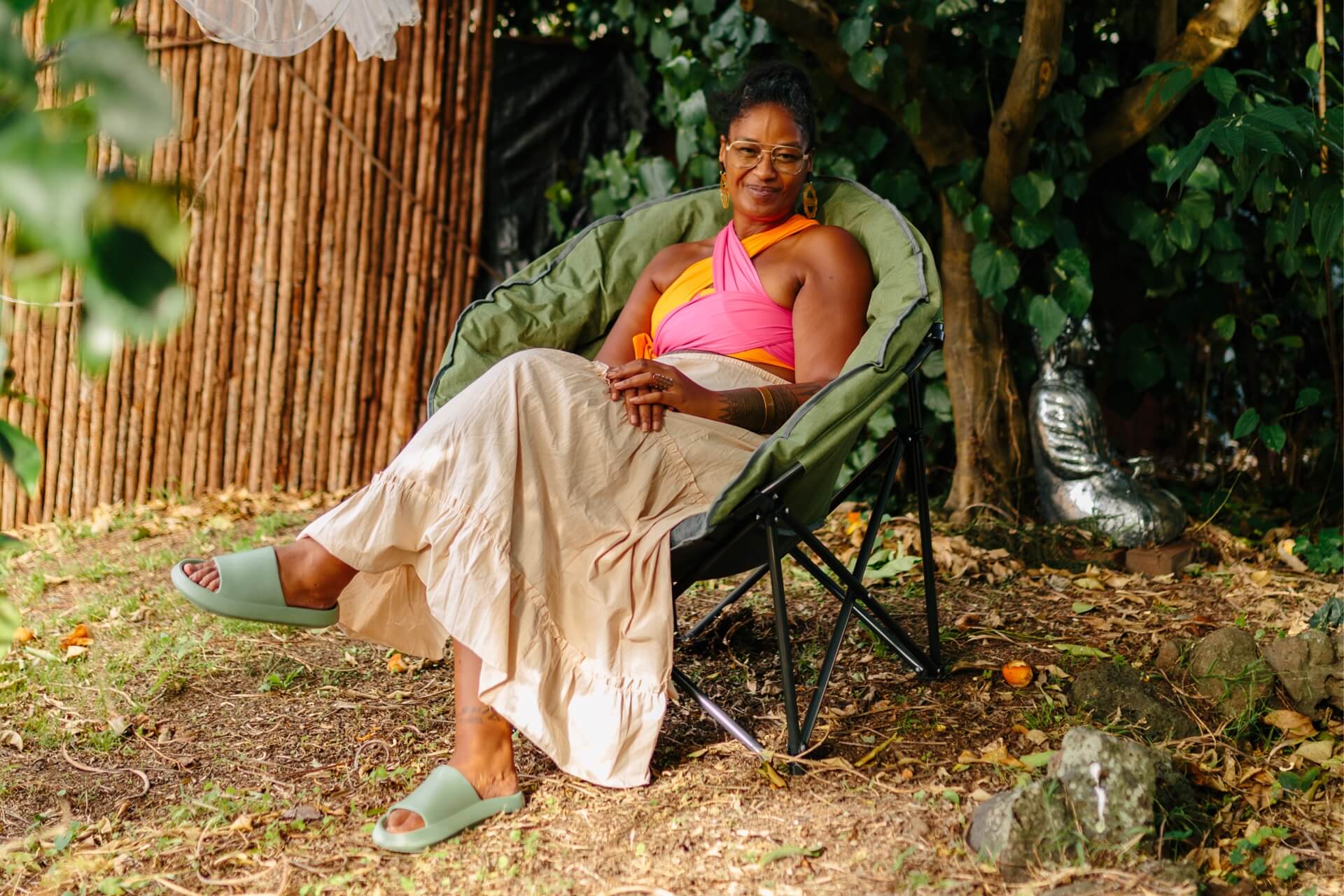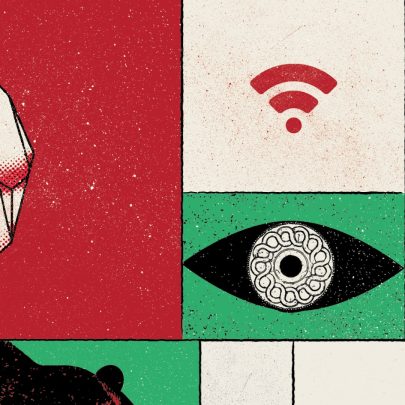May 25, 2022 People
When Teremoana Rapley joins our Zoom call, she’s sitting sun soaked in her garden, surrounded by lush greenery, takeaway coffee in hand. “This is where we would have sat if you came over,” she tells me. “I don’t invite everyone to my house.”
I instantly regret going down the virtually disembodied path of Zoom, but I chose caution and safety over my real desire to see Rapley’s home studio, and the long-shot possibility of becoming friends IRL.
There’s a lot of cool shit you could say about Rapley: leaving home at 14 to join the music industry; being a low-key child maths genius; having dinner with Louis Farrakhan and the Nation of Islam in Detroit at 17; Upper Hutt Posse; Moana and the Moahunters; What Now; Mai Time; more than 3000 television production credits; and a late-found family connection to Jimi Hendrix. And I’ve barely scratched the surface.
To Rapley herself, they’re just “sound bites” and “bits and pieces” of her life that continue to be picked up and repeated by media without the wider context of her full story. “People are talking about my dad, and they’re talking about the pain of my mother and her being a functioning alcoholic, and they’re talking about diversity and inclusion completely out of context.”
When asked if there are journalistic fixations that are particularly irksome, she tells me: “I haven’t been in Upper Hutt Posse for over two decades. I have got nothing to say about them in 2022, or 2021, or 2020. I don’t know why I’m asked about that when I was a 14-year-old kid.” I nod, crossing any question that mentions Upper Hutt Posse off my list.
Rapley is also a comic-book collector (particularly Spawn), a grandmāmā, a lead strategist at Auckland Unlimited with a long career of working in local government and council organisations, and now, at 49, also a ‘Black Moana Sovereign Storyteller’. It was in those spaces that systematically stop people from bringing their full selves to the table that Rapley got to the point where she realised she was going to be her unapologetic self.
In response to my curiosity about where the label ‘Black Moana Sovereign Storyteller’ comes from, Rapley remembers a conversation she was brought into by musician and artist Coco Solid as part of Equalize My Vocals, “a project about everyone being treated fairly within all factions of New Zealand music”. During the panel discussion, the questions about the music industry didn’t resonate with Rapley. “I was thinking … that hasn’t been my experience.”
However, when she later watched back her answers, about music always having been a part of her as opposed to her intentionally making music, she realised she might have been hitting on something. The following year, just before leaving to attend an Indigenous storytelling residency in Banff, Canada, Rapley had another conversation with Coco Solid, which discussed sovereignty and helped her to see that “storytelling comes from the beats, it comes from the community engagement, it comes from writing for magazines, it comes from video content, it comes from producing, storytelling comes in many forms”.
When I ask for a definition, she tells me: “I do everything in a way that can only be done by me. And I am a child of Moananui a Kiva, and I’m also a child of Africa through the transatlantic slave trade. And both of those parts of my whakapapa live under a space where our sovereignty was taken away. But the one thing that remained was storytelling.”
I know I’m going to quote the definition as soon as Rapley says it, and she knows it, too. “If you print that definition, that’s what people will say it is forever. But it’s everything and more — you know what I mean?”
There is an undeniable resistance to being fixed into one thing, or having her story simplified for the sake of a catchy piece of journalism. Being in the spotlight for most of her life, Rapley has been layered and labelled by other people, and is now clear about the importance of her sovereignty being about her ability to both live and create in ways that are personal for her and detached from what others think, including larger forces at play, like the music industry.
She sees the media as part and parcel of the music machine at work — that is glaringly apparent — and so there is a straightupness in the articulations of her sovereignty that feel protective, perhaps even guarded. And yet this sits in contrast to her music, which is anything but; rather, it’s an exposing of her heart and soul to an audience.
Rapley’s Auckland Arts Festival show Daughter of a House Girl fell victim to the nationwide cancellations of this most recent Covid surge. The show was the world premiere of her story through song and visuals from her debut album of the same name. But when I naively con- gratulate her on completing her album, she is quick to tell me it is “nowhere near done”.
“What is normal in the industry — to have everything sorted and ready to go — I’m not following any of that,” she says. “When it comes to my album and where it is right now, it is where it needs to be. People probably think I’m going to release all of the songs at once but I haven’t actually decided, because I can do whatever I want, when- ever I want.”
Daughter of a House Girl is a dedication to Rapley’s late mother, who was hard working, with an attitude that meant she didn’t worry about things out of her control, two characteristics that Rapley identifies with. “She was an excellent gardener, she was a doughnut maker, she could feed a family of four or six. We lived a very frugal life. We grew vegetables in the garden and we went fishing off the Petone wharf and Ngauranga Gorge. We went eeling in the Hutt River. I mean, those are the things I did growing up. Those are things my mum taught me.
“Even though we probably grew up in poverty, you just made do with what you had. And that’s part of my mum’s upbringing in the islands: The kai’s around you. So what are you saying that you’re hungry — just go out and get it. That’s the way that my mum brought me up and I believe I’ve probably applied that to everything that I’ve done.”
This resourcefulness in her childhood home has followed Rapley into adult life. If there was ever a skill set she needed but didn’t have, she would just go and learn it. “I wanted to do a website, so I went and got a book out of the library on how to build a website over a weekend.” It’s no wonder her CV is so extensive.
When Rapley had her first child at 20 (and also owned her own home), her mum and younger brother moved in with her. Rapley hadn’t spent much time with her mum since leaving home at 14. But as a grandmother to her new grandchild, Rapley says, “she stepped in”. Taking care of her daughter, she taught Rapley how to wrap pareu around her stomach to pull it back into place after giving birth. She would massage her daughter and find rongoā around their house. “She just looked after me like I’d never seen her look after me in my life. That nurturing side of my mum I hadn’t really seen before.” I can’t help but wonder if her mum’s love language was expressed through acts of service, the kind Rapley, too, shows in her own work.
I’m curious to know what she is most proud of from her expansive career. She tells me it’s the fact that she’s still standing and so are her kids, because statistically, they shouldn’t be. While there are currently three living generations of her family, her goal is for there to be five. Caring for and prioritising herself, then, are of the utmost importance to ensure the longevity of her mother’s legacy and her own, not only as the daughter of a house girl, but also as Teremoana Rapley in her most unapologetic form.






